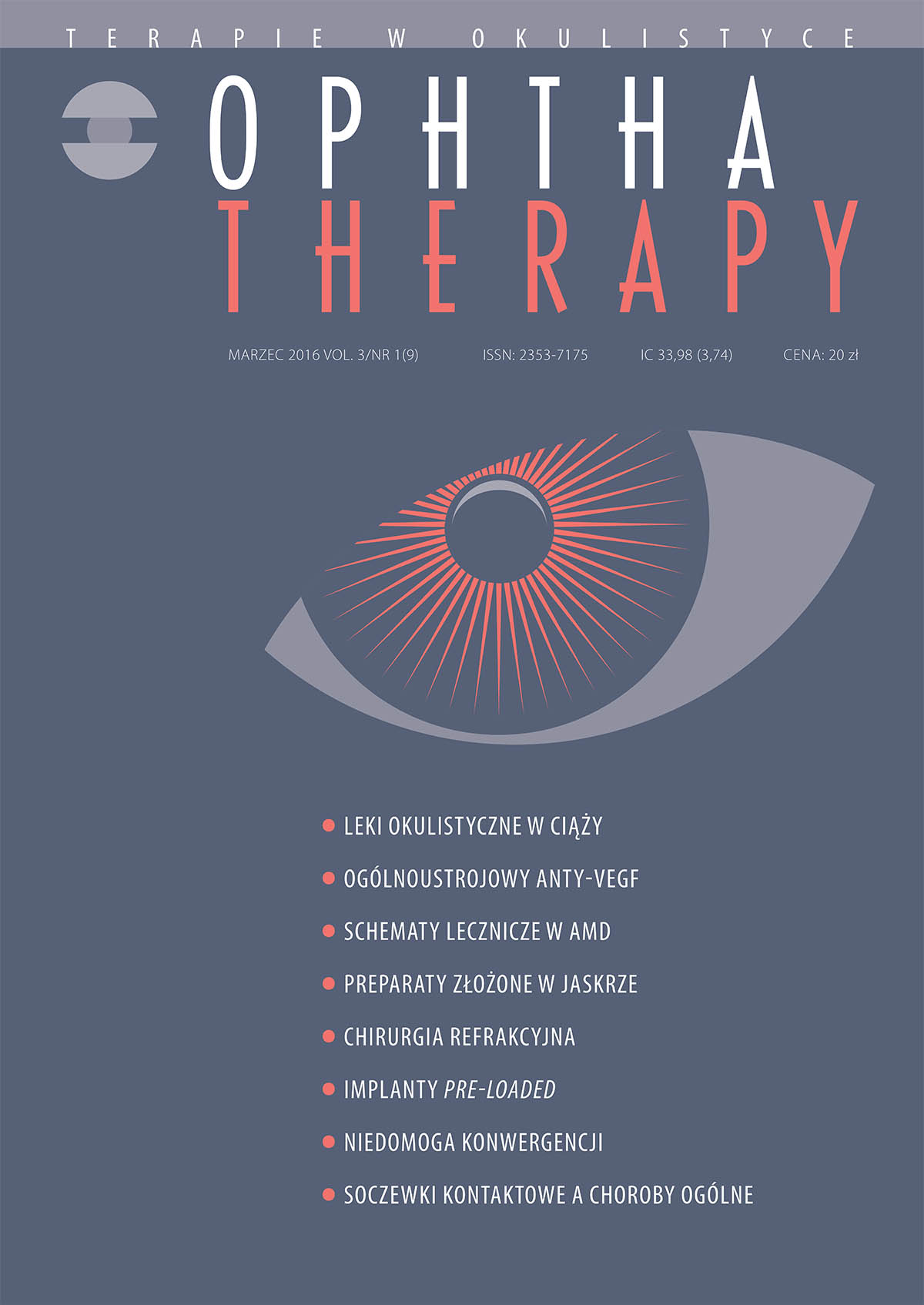Convergence insufficiency: efficacy of non-surgical treatment in patients of different ages
Main Article Content
Abstract
The convergence insufficiency is a common binocular vision disorder, which occurrence is evaluated for about 5% of population. Though it was described for the first time by Albrecht von Graefe in 1855, only recently have the controlled studies results on different treatment methods effectiveness come to light. This article aims to present recent ideas about convergence insufficiency non-surgical treatment that is intended for patients in all ages.
Downloads
Article Details

This work is licensed under a Creative Commons Attribution-NonCommercial-NoDerivatives 4.0 International License.
Copyright: Medical Education sp. z o.o. License allowing third parties to copy and redistribute the material in any medium or format and to remix, transform, and build upon the material, provided the original work is properly cited and states its license.
Address reprint requests to: Medical Education, Marcin Kuźma (marcin.kuzma@mededu.pl)
References
2. Kratka WH, Kratka Z. Convergence insufficiency; its frequency and importance. Am Orthopt J. 1956; 6: 72-3.
3. White JW, Brown HW. Occurrence of vertical anomalie associated with convergent and divergent anomalies. Arch Ophthalmol. 1939; 21(6): 999-1009.
4. Kent PR, Steeve JH. Convergence insufficiency, incidence among military personnel and relief by orthoptic methods. Military Surgeon. 1953; 112(3): 202-5.
5. Mahto RS. Eyestrain from convergence insufficiency. Br Med J. 1972; 2(5813): 564-5.
6. Passmore JW, MacLean F. Convergenceinsufficiency and its managements: an evaluation of 100 patients receiving a course of orthoptics. Am J Ophthalmol. 1957; 43(3): 448-56.
7. Mazow M. The convergence insufficiency syndrome. J Pediatr Ophthalmol. 1971; 8: 243-44.
8. Rouse MW, Borsting EJ, Mitchell GL et al. Validity and reliability of the revised convergence insufficiency symptom survey in adults. Ophthalmic & Physiological Optics. 2004; 24(5): 384-90.
9. Cooper J, Jamal N. Convergence insufficiency-a major review. Optometry. 2012; 83(4): 137-58.
10. Krohel GB, Kristan RW, Simon JW et al. Posttraumatic convergence insufficiency. Ann Ophthalmol. 1986; 18(3): 101-2.
11. Cohen M, Groswasser Z, Barchadski R et al. Convergence insufficiency in brain-injured patients. Brain Inj. 1989; 3(2): 187-91.
12. Kowal L. Ophthalmic manifestations of head injury. Aust. NZ. J Ophthalmol. 1992; 20(1): 35-40.
13. Brahm KD, Wilgenburg HM, Kirby J et al. Visual Impairment and dysfunction in combat-injured service members with traumatic brain injury. Optom Vis Sci. 2009; 86(7): 817-25.
14. Goodrich GL, Kirby J, Cockerham G et al. Visual function in patients of a polytrauma rehabilitation center: A descriptive study. J Rehabil Res Dev. 2007; 44(7): 929-36.
15. Stelmack JA, Frith T, Van Koevering D et al. Visual function in patients followed at a Veterans Affairs polytrauma network site: an electronic medical record review. Optometry. 2009; 80(8): 419-24.
16. Biousse V, Skibell BC, Watts RL et al. Ophthalmologic features of Parkinson?s disease. Neurology. 2004; 62(2): 177-80.
17. Burke JP, Shipman TC, Watts MT. Convergence insufficiency in thyroid eye disease. J Pediatr Ophthalmol Strabismus. 1993; 30(2): 127-9.
18. Granet DB, Gomi CF, Ventura R et al. The relationship between convergence insufficiency and ADHD. Strabismus. 2005; 13(4): 163-8.
19. Tamminga CA, Stan AD, Wagner AD. The hippocampal formation in schizophrenia. Am J Psychiatry. 2010; 16: 1178-93.
20. Bolding MS, Lahti AC, Gawne TJ et al. Ocular convergence deficits in schizophrenia. Front Psychiatry. 2012; 3: 86.
21. Scheiman M, Cotter S, Rouse M et al. Randomized clinical trial of the effectiveness of base-in prism reading glasses versus placebo reading glasses for symptomatic convergence insufficiency in children. Br J Ophthalmol. 2005; 89(10): 1318-23.
22. Teitelbaum B, Pang Y, Krall J. Effectiveness of base in prism for presbyopes with convergence insufficiency. Optom Vis Sci. 2009; 86(2): 153-6.
23. Dusek WA, Pierscionek BK, McClelland JF. An evaluation of clinical treatment of convergence insufficiency for children with reading difficulties. BMC Ophthalmol. 2011; 11(1): 21.
24. Scheiman M, Mitchell GL, Cotter S et al. A randomized clinical trial of treatments for convergence insufficiency in children. Arch Ophthalmol .2005; 123(1): 14-24.
25. Scheiman M, Mitchell GL, Cotter S et al. Trial of vision therapy/orthoptics versus pencil pushups for the treatment of convergence insufficiency in young adults. Optom Vis Sci. 2005; 82(7): 583-95.
26. Convergence Insufficiency Treatment Trial Study Group. Randomized clinical trial of treatments for symptomatic convergence insufficiency in children. Arch Ophthalmol. 2008; 126(10): 1336-49.
27. Convergence Insufficiency Treatment Trial Study Group. The convergence insufficiency treatment trial: design, methods, and baseline data. Ophthalmic Epidemiol. 2008; 15(1): 24-36.
28. Convergence Insufficiency Treatment Trial Study Group. Long-Term Effectiveness of Treatments for Symptomatic Convergence Insufficiency in Children. Optometry and Vision Science: official publication of the American Academy of Optometry. 2009; 86(9): 1096-103.
29. Birnbaum MH, Soden R, Cohen AH. Efficacy of visiontherapy for convergence insufficiency in an adult male population. J Am Optom Assoc. 1999; 70(4): 225-32.
30. Alvarez TL, Vicci VR, Alkan Y et al. Vision therapy in adults with convergence insufficiency: clinical and functional magnetic resonance imaging measures. Optom Vis Sci. 2010; 87(12): 985-1002.
31. Sapkota K, Sah DK, Bhattarai S et al. Effectiveness of pencil push up therapy in patients with convergence insufficiency: a pilot study. Health Renaissance. 2011; 9(3): 157-61.
32. Serna A, Rogers DL, McGregor ML et al. Treatment of symptomatic convergence insufficiency with a home based computer orthoptic exercise program. J AAPOS. 2011; 15(2): 140-3.
33. Cooper J, Feldman J. Operant conditioning of fusional convergence ranges using random dot stereograms. Am J Optom Physiol Optics. 1980; 57(4): 205-13.
34. Daum KM, Rutstein RP, Eskridge JB. Efficacy of computerized vergence therapy. Am J Optom Physiol Optics. 1987; 64(2): 83-9.
35. Cooper J, Feldman J. Reduction of symptoms in binocular anomalies using computerized home therapy-HTS. Optometry. 2009; 80(9): 481-6.

